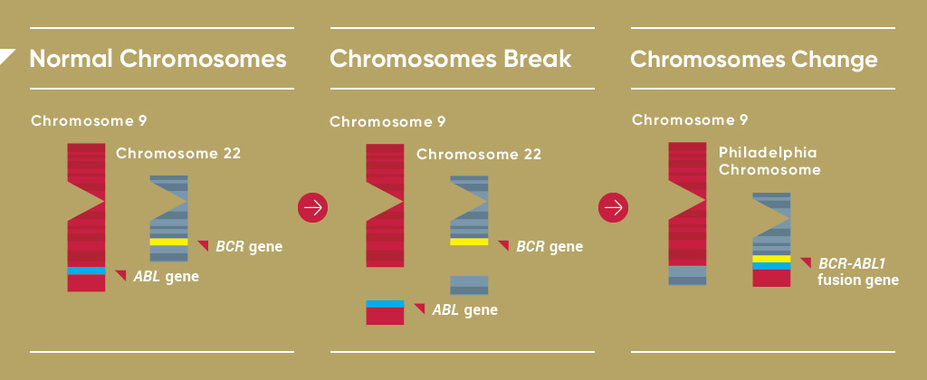
Information about Ph+ CML in chronic phase that you may find helpful
Even if you've been living with Philadelphia chromosome–positive chronic myeloid leukemia (Ph+ CML) in chronic phase for a while, it's still helpful to understand the biology behind the disease and what's happening in your body.
A swap between chromosomes 9 and 22 creates the Ph chromosome
What causes Ph+ CML?
Ph+ CML is caused by an abnormal fusion gene called BCR‑ABL1. It is the result of pieces of 2 chromosomes in the body trading places.
Here’s a brief overview:
Each cell in the human body has 23 pairs of chromosomes
In Ph+ CML, pieces from chromosomes 9 and 22 break off and swap places
This can create a new abnormal chromosome known as the Philadelphia (Ph) chromosome
The Ph chromosome creates the abnormal BCR-ABL1 fusion gene
This abnormal gene then produces an abnormal protein called BCR-ABL
How does Ph+ CML affect the body?
Ph+ CML affects your bone marrow and your blood. Your bone marrow is a sponge-like tissue in the center of most of your bones. |
Here’s what happens in the bone marrow:
The BCR-ABL protein sends too many signals to the bone marrow
The bone marrow starts creating too many immature white blood cells (commonly referred to as blast cells)
These cells, which your doctor may call leukemic cells, grow abnormally and do not become healthy white blood cells
The leukemic cells start to grow and divide and build up, crowding out red blood cells and platelets in the bone marrow
Here’s what happens in the bloodstream:
As the bone marrow becomes overcrowded with leukemic cells, these cells move into the bloodstream
Over time, the leukemic cells crowd out healthy red blood cells, white blood cells, and platelets
This can lead to serious health problems, including, but not limited to, a greater risk of infections, as well as anemia, bruising easily, and bleeding that takes longer to stop
Doctors categorize Ph+ CML in phases instead of stages
While many types of cancer are categorized into stages, doctors assign 1 of 3 phases to Ph+ CML:
Chronic phase: The first phase of Ph+ CML, when the number of white blood cells is higher than normal. Most adults are diagnosed in chronic phase
Accelerated phase: The second phase of Ph+ CML, in which the number of immature white blood cells in the blood and bone marrow may increase rapidly
Blast phase: The third and final phase of Ph+ CML. This phase has the highest number of immature blood cells in the blood and bone marrow
Take an active role in learning about Ph+ CML
The more you know about your disease, the better you may be able to communicate with your doctor. Go to the Helpful Resources page to find contact information for a wide range of advocacy groups that support patients with Ph+ CML. You’ll also learn about one of the many apps that you can use to track your treatment and connect with patients.
|
Learn about SCEMBLIX as a treatment option
By being your own advocate, you can work closely with your doctor to determine whether SCEMBLIX is right for you.
SCEMBLIX is a prescription medicine used to treat adults with:
Philadelphia chromosome–positive chronic myeloid leukemia (Ph+ CML) in chronic phase (CP), previously treated with 2 or more tyrosine kinase inhibitors (TKIs). Learn More
Ph+ CML in CP with the T315I mutation. Learn More
It is not known if SCEMBLIX is safe and effective in children.


